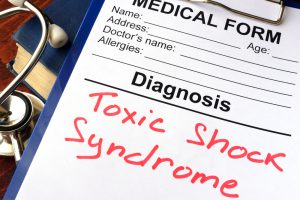 Toxic shock syndrome (TSS) is a rare but potentially life-threatening condition caused by harmful toxins produced by staphylococcus or streptococcus bacteria. The bacteria Clostridium sordellii may also cause TSS; however, occurrences are less common.
Toxic shock syndrome (TSS) is a rare but potentially life-threatening condition caused by harmful toxins produced by staphylococcus or streptococcus bacteria. The bacteria Clostridium sordellii may also cause TSS; however, occurrences are less common.
Staphylococcus, streptococcus, and Clostridium sordellii bacteria typically live in our nose and mouth, and on our skin without causing harm. However, when they enter the body through cuts in the skin or small tears in the vagina, they can get into the bloodstream and spread to vital organs, causing severe damage and illness.
Although toxic shock syndrome is commonly associated with women who use tampons, especially the super-absorbent types, it can affect anyone including men and children. The risk factors for developing TSS include:
- Using super-absorbent tampons for longer than the recommended use
- Using menstrual cups, diaphragms, or contraceptive sponges
- Recent childbirth, miscarriage, or abortion
- Having had recent surgery
- Having any type of staph infection
- Having cuts or burns on the skin
The signs and symptoms of toxic shock syndrome vary and may include:
- Fever
- Rash
- Bright red eyes, lips, and tongue
- Low blood pressure
- Headaches
- Confusion
- Muscle aches
- Vomiting or diarrhea
- Dizziness
- Difficulty breathing
- Seizures
If you are at risk of developing TSS and are experiencing any of these symptoms, please see a doctor or go to your nearest emergency department right away. If left untreated, toxic shock syndrome can result in amputations or even death.
Treatment for TSS is dependent on severity and other factors such as your age and medical history. Treatment may include wound cleaning, antibiotics, intravenous (IV) medications to treat shock or prevent organ damage, heart medications, supplemental oxygen, or dialysis.
All content of this newsletter is intended for general information purposes only and is not intended or implied to be a substitute for professional medical advice, diagnosis or treatment. Please consult a medical professional before adopting any of the suggestions on this page. You must never disregard professional medical advice or delay seeking medical treatment based upon any content of this newsletter. PROMPTLY CONSULT YOUR PHYSICIAN OR CALL 911 IF YOU BELIEVE YOU HAVE A MEDICAL EMERGENCY.
